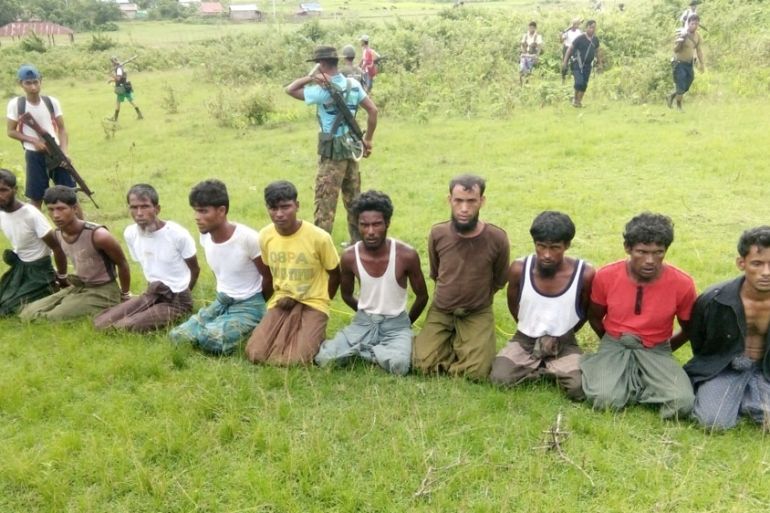Lawsuit: Aung San Suu Kyi ‘committed crimes’ against Rohingya
Human rights icon Suu Kyi accused of ‘tending towards the annihilation of the Rohingya’, criminal complaint alleges.

Yangon, Myanmar – Before becoming Myanmar‘s leader, Aung San Suu Kyi spent 15 years under house arrest for defying the country’s feared generals. Now, the Nobel peace laureate faces an attempt to have her imprisoned for supporting them.
A lawsuit filed in Argentina on Wednesday alleges the former human rights icon contributed to a genocidal campaign against the Rohingya minority that included military-led mass killings in August 2017.
Keep reading
list of 3 itemsUN chief ‘deeply concerned’ over Rohingya crisis
Inaction on China and India’s crimes emboldens Myanmar
Among other things, she oversaw government policies “tending towards the annihilation of the Rohingya”, such as confining them to “ghettos” with severely limited access to healthcare and education, the lawsuit said.
“For the cycle of violence to end, it is crucial that all those responsible for the genocide – whether they wear a uniform or not – are brought to justice,” said Tun Khin, president of the London-based Burmese Rohingya Organisation UK (BROUK), which filed the case at a federal court in Buenos Aires.
Efforts at securing justice for the Rohingya have so far largely focussed on top generals who orchestrated the 2017 killings in coastal Rakhine state, including the military’s commander-in-chief Min Aung Hlaing.
Some, such as former Australian prime minister Kevin Rudd, have defended Aung San Suu Kyi by arguing she has little control over the military, which maintains ultimate power in Myanmar despite allowing a largely free-and-fair election in 2015.
But the criminal complaint against her said she used what power she did have to help, rather than hinder, efforts to destroy the Rohingya.
“The entire genocidal plan … could not have been deployed without the complementation, the coordination, the support or the acquiescence of the different civilian authorities,” the complaint said.
“On the one hand, you have the horrendous crimes committed by the military on the ground, which include murder, gang rape, torture and so on,” Tomas Ojea Quintana, a lawyer representing BROUK, who is also a former UN rights envoy for Myanmar, told Al Jazeera.
“But on the other hand, you have a large list of policies … that are the responsibility of the civilian authorities.”
They include keeping tens of thousands of Rohingya confined to camps and neighbourhoods behind barbed wire fencing and checkpoints in Sittwe, Rakhine’s provincial capital.
“I’ve been to these ghettos many times and I know first-hand how they are held there without any possibility of moving outside,” Ojea Quintana said.
‘Well funded’ conspiracy
Myo Nyunt, a spokesman for Aung San Suu Kyi‘s National League for Democracy, suggested this and other lawsuits were part of a “well-organised and well-funded” international conspiracy to establish an autonomous region for the Rohingya within Myanmar.
“That’s a violation of Myanmar’s sovereignty so we cannot give in no matter how the international pressure mounts,” he said. “The sovereignty of a nation is a most precious thing to protect at any cost.”
“Our leader tried her best to prevent any kind of violence” during the 2017 attacks, he added.
Myanmar’s military, supported by the government, has vehemently rejected UN investigators’ conclusions that it committed genocide, arguing they were legitimate operations against an armed Rohingya group it calls “terrorists”.
Wednesday’s complaint came just days after The Gambia filed a separate lawsuit against Myanmar at the International Court of Justice.
On Thursday, the International Criminal Court (ICC) approved another investigation into crimes against the Rohingya.
Myanmar has not signed up to the ICC but its neighbour Bangladesh has. Prosecutors argued the court should have jurisdiction to investigate the crime of mass deportation after more than 730,000 Rohingya fled the 2017 attacks to Bangladesh.
Unlike the other two cases, BROUK’s petition to Argentina relies on states’ ability to exercise universal jurisdiction for certain grave crimes – meaning any country can prosecute regardless of where the crime was committed and who was involved.
Rohingya testimony
Argentinian courts have taken up other universal jurisdiction cases in the past, including on abuses committed under Spain’s former dictator Francisco Franco and against China’s Falun Gong movement.
The Buenos Aires court will now consult a federal prosecutor for his opinion on whether the complaint should proceed. He is expected to respond within two weeks, Ojea Quintana said.
The court would then hear evidence, including testimony from Rohingya witnesses, before deciding whether to call Aung San Suu Kyi and other defendants to the court, he added.
If they refuse to come “one possibility is to issue arrest warrants”, he said.
Former presidents Thein Sein and Htin Kyaw are also named in the complaint, along with several senior military officials.
Aung San Suu Kyi’s official title is “state counsellor”, a position created especially for her to get around a constitutional clause that prevents her being president because she has foreign children.